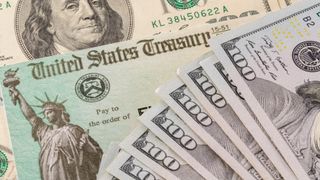Stimulus check income limit changed: How much will you get?
Deal made to lower eligibility caps for stimulus checks

The Biden administration’s $1.9 trillion stimulus-relief package will lower the income eligibility cap for the next round of direct payments. That means millions of Americans who received stimulus checks 1 and 2 will be left out this time — and many more will get less money than they expected.
President Joe Biden met with Senate Democrats this week and struck a deal to eliminate stimulus checks completely for individual taxpayers earning more than $80,000 and couples making more than $160,000. Those making up to $75,000 and $150,000, respectively, will still receive the full $1,400 per taxpayer, plus the same amount for each eligible dependent.
- Third stimulus check update: Timeline, calculator and more
- Third stimulus check calculator: See how much money you'll get
- Plus: How to watch Riverdale season 5 online
Previous versions of the Biden proposal capped eligibility at $100,000 for individuals and $200,000 for couples.
The estimated impact of this change varies widely: The left-leaning Institute on Taxation and Economic Policy estimates that 17 million people would become ineligible under the new Senate bill, while right-leaning groups like the Tax Foundation and the American Enterprise Institute put those numbers between 6.5 million and 8.7 million.
In addition to the millions of individuals and families who will be left out entirely, other taxpayers will see much smaller checks than expected.
Under the version of the bill the House passed last week, payments would phase out over a $25,000 window for single filers (between $75,000 for the full amount and $100,000 for the cap) and a $50,000 window for couples filing jointly.
Under the new limits agreed to by Biden and Senate Democrats, payments phase out over just $5,000 for single filers and $10,000 for joint filers. Americans who were expecting to get $1,000 or more may see just a few hundred dollars.
Sign up to get the BEST of Tom’s Guide direct to your inbox.
Upgrade your life with a daily dose of the biggest tech news, lifestyle hacks and our curated analysis. Be the first to know about cutting-edge gadgets and the hottest deals.
| Row 0 - Cell 0 | Proposed Senate version | House-passed bill | Stimulus check 2 (Dec. 2020) | Stimulus check 1 (March 2020) |
| Check amount | $1,400 | $1,400 | $600 | $1,200 |
| Income cap for full amount (individuals/couples) | $75,000/$150,000 | $75,000/$150,000 | $75,000/$150,000 | $75,000/$150,000 |
| Income cap for prorated checks (individuals) | $80,000 | $100,000 | $87,000 | $99,000 |
| Income cap for prorated checks (couples) | $160,000 | $200,000 | $174,000 | $198,000 |
What happened in the Senate?
In order for a stimulus package to pass the Senate without any Republican support, every Democrat would have to be on board.
Some moderate senators, like Sen. Joe Manchin (D-West Virginia), have pushed for changes to reduce spending, particularly around stimulus-check eligibility. Their argument is that people on the higher end of the income scale don't need the money.
" think we could drop it below the $200,000 [income level] and still get households that really need it," said Sen. Jeanne Shaheen (D-New Hampshire) earlier this week.
More progressive lawmakers, especially in the House, have expressed concern about narrowing stimulus-check eligibility as well as watering down the proposal in other ways.
The next steps
Because the Senate is making significant changes to the income caps and has already removed the minimum-wage hike that was in the bill the House passed, the Senate version will have to go to the House for another vote before it can head to the White House for Biden's signature.
The Senate may open debate on the bill as early as Thursday evening (March 4). Republicans are planning to stretch out debate as long as possible. Sen. Ron Johnson (R-Wisconsin) hinted that he may ask Senate clerks to read out all 600 pages of the bill on the Senate floor, which would take about 10 hours.
Despite the theatrics, Biden's bill enjoys wide support among American voters. A Monmouth poll over the weekend found that 62% of respondents backed the bill. In a Hill-Harris X poll last week, 58% of registered voters said Congress was moving too slowly on the stimulus package.
Biden and Democratic leaders in Congress want to have the stimulus bill signed by March 14 so that there's no cutoff in unemployment-benefit supplements to states. If that deadline is met, stimulus checks could start hitting bank accounts by the week of March 15.
Emily Long is a Utah-based freelance writer who covers consumer technology, privacy and personal finance for Tom's Guide. She has been reporting and writing for nearly 10 years, and her work has appeared in Wirecutter, Lifehacker, NBC BETTER and CN Traveler, among others. When she's not working, you can find her trail running, teaching and practicing yoga, or studying for grad school — all fueled by coffee, obviously.

